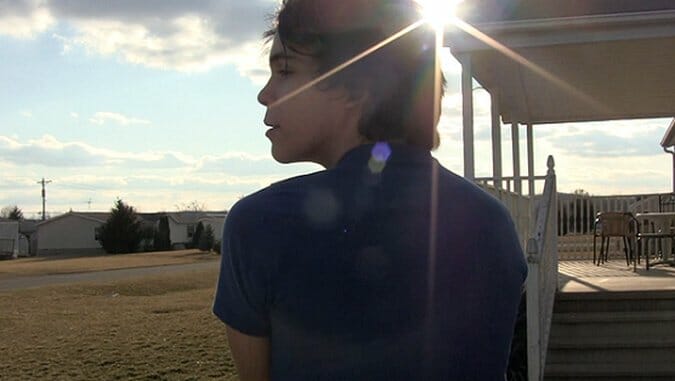
After a breakup with a boyfriend, journalist David Thorpe found himself single and in his 40s. To navigate his existential crisis, Thorpe turned to documentary filmmaking and Kickstarter to make Do I Sound Gay?, which premiered at the 2014 Toronto International Film Festival. The feature is ostensibly Thorpe’s journey of self-discovery while confronting his deep-seated anxiety about “sounding gay,” but it’s also a surprising peek into cultural and sexual stereotypes that pervade American popular culture, yet are rarely discussed.
At the start of the film, Thorpe investigates reasons why he’s not satisfied with his life and the way he sounds, which he believes announces his sexual orientation. Through a number of on-camera interviews with family, friends, linguistic experts, strangers and celebrities, including writer David Sedaris, sex-advice columnist Dan Savage, fashion expert Tim Gunn, actor George Takei and CNN anchor Don Lemon, he discusses the “gay voice”—with its characteristics of upspeak, over-articulation, the use of longer vowels and “s” sounds, aka the “gay lisp.”
One language expert in the film is quick to remind the audience there’s no scientific proof there is even a “gay voice”—it’s a stereotype, after all—and there are straight men who sound gay and many gay men sound butch. First-time filmmaker Thorpe, however, offers plenty of anecdotal evidence to refute this claim, including one of his best friends admitting to turning down the gayness at work and other interviewees pinpointing the year in which Thorpe started sounding gay.
In one of its more interesting exploratory threads, Do I Sound Gay? examines why the timbre of a man’s voice, in particular, can lead to negative connotations. Several gay subjects talk about how they prefer a hyper-hetero masculine voice, uncovering a sort of internalized homophobia in the gay community. One man tells Thorpe it’s a turnoff to hear a voice that sounds more feminine than masculine in bed. Others explain that kids and teenagers are judged on how they walk and talk growing up, and gay kids learn quickly that being different can often lead to bullying and violence. Even Sedaris, who jokes that his higher-pitched voice is often mistaken for a woman’s, admits he’s pleased when people tell him they didn’t know he was gay, but hates himself for it at the same time.
In between interviews with talking heads, Thorpe works with language and accent coaches to change his speaking voice. In several funny on-screen moments, he practices these exercises to break him of years of vocal habits. His humor is deadpan, self-deprecating and wholly entertaining. He offhandedly points out the headshot of “the great Joe McIntyre” from New Kids on the Block in one of the experts’ offices and later chastises his cat for mimicking (or mocking) one of his practice sessions with a well-placed “mee-owww.”
Despite more than enough film fodder on issues of voice, gender and sexuality, Thorpe and his editing team (Nicholas Bussey and Maeve O’Boyle) also cram in a CliffsNotes history of the gay male in popular culture. The filmmakers show how the “gay” voice was often used in negative ways in both live-action and animated films, from Captain Hook in the 1953 animated classic Peter Pan to Jeremy Irons’ nefarious Scar in The Lion King. A film expert suggests the celluloid shift from the innocuous gay male character of the 1930s occurred during Clifton Webb’s portrayal of a killer in Otto Preminger’s Laura (1944). Do I Sound Gay? also includes a perfunctory review of the men who introduced camp into mainstream pop culture, singling out Paul Lynde, Liberace, Charles Nelson Reilly and, to an extent, Truman Capote. While these are all interesting bits of history, the already disorganized film provides too quick an overview for any meaningful insight, debate or commentary.
And that’s the film’s major stumbling block: It darts from theme to theme with only a cursory examination of the complex questions it raises. While Do I Sound Gay? provides an entertaining and humorous look at Thorpe’s gradual self-acceptance, its unfocused narrative and lack of depth only hint at a subject that runs much deeper.
Director: David Thorpe
Writer: David Thorpe
Starring: Margaret Cho, George Takei, Dan Savage, Tim Gunn, Don Lemon and David Sedaris
Release Date: Opens in limited release July 10, 2015
Christine N. Ziemba is a Los Angeles-based freelance pop culture writer and regular contributor to Paste. You can follow her on Twitter.